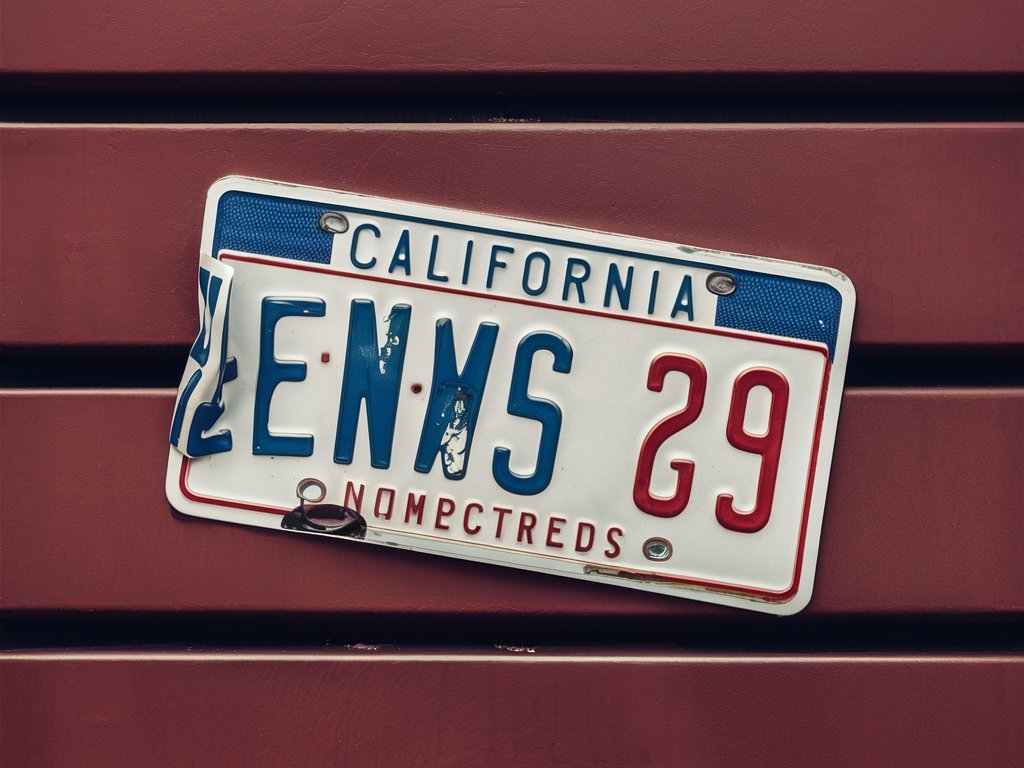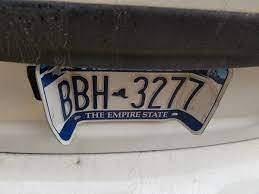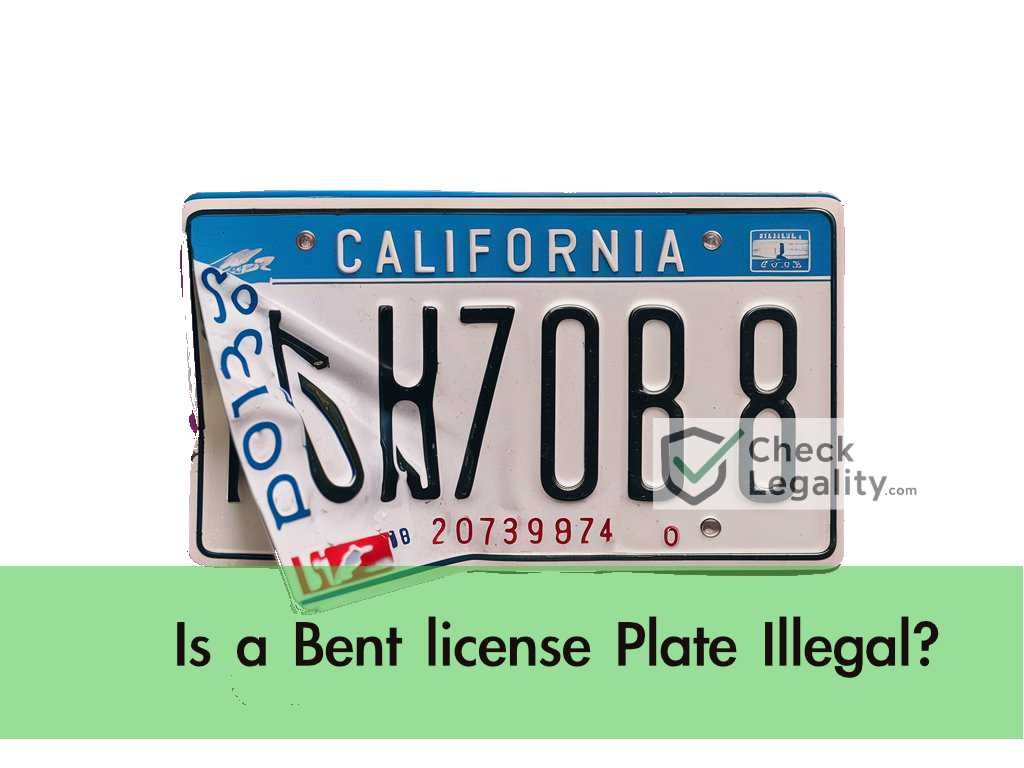Bent License Plates: A Legal and Safety Quagmire
We’ve all seen them on the road: cars with license plates that are a little worse for wear, sporting a concerning bend. But is a bent license plate actually illegal? The answer, unfortunately, isn’t a simple yes or no. It depends on the severity of the bend and the specific laws of your state or country.
Navigating the Legal Maze: State by State
The United States has no federal regulations regarding license plate conditions. Instead, to check the legality of a bent plate falls to individual states. Many states have laws requiring license plates to be “clearly legible” or “readily visible from a distance of 50 feet.” If a bent plate obscures any letters, numbers, or registration stickers, it likely violates these laws and could result in a ticket.
Here’s the rub: the level of enforcement can vary greatly. A police officer might overlook a minor bend that doesn’t obscure any information, for example, numbers, letters, or state information, while a severely mangled plate will likely attract attention.

Beyond the US: A Global Perspective
The situation is similar in other countries. Most have regulations requiring license plates to be visible and undamaged. However, specific enforcement can differ. In some countries, a bent plate might be a minor offense, while in others, it could lead to hefty fines or even vehicle impoundment.
Causes of Bent License Plates: From Parking Lot Mishaps to Faulty Frames and Beyond
Bending a license plate is surprisingly easy, and the culprits can be as varied as everyday driving situations. Here’s a closer look at some common causes:
- Parking Lot Perils: Tight parking spaces are a breeding ground for bent plates. Refrain from judging the distance between your car and a curb, another vehicle, or even a shopping cart can easily result in a rude encounter with metal.
- Car Washes Gone Wrong: Automatic car washes are a convenient way to keep your car clean, but they can also be hazardous for your license plate. The aggressive machinery used in some car washes can snag or bend a plate if it’s not securely fastened. If you’re opting for an automatic wash, consider removing your license plate beforehand or using a touchless wash option.
- Flimsy Frames: License plate frames are more than just decorative accessories. A high-quality frame can provide extra protection against bumps and dings that could otherwise bend your plate. However, cheap plastic frames can become brittle and crack over time, offering little to no protection.
- Vandalism: Unfortunately, license plates can be targets for vandalism. This could involve anything from intentional bending or scratching to theft of the entire plate. If you suspect your license plate has been vandalized, then you should, at the discovery, report the incident to the police immediately.
- Loose Mounting Hardware: Over time, the screws or bolts that hold your license plate in place can become loose or rusty. This can cause the plate to wobble and become more susceptible to bending, especially during car washes or even strong winds while driving. It’s important to regularly check the tightness of your license plate mounting hardware.

Keeping Your Plates Straight and Legal: Solutions and Prevention
If your license plate is bent, here are some steps you can take:
- Check Your State’s Laws: Research your state’s specific regulations regarding license plate conditions. This will give you a better understanding of the potential consequences of a bent plate.
- Replace a Severely Bent Plate: If the bend is significant and obscures any information, replacing the plate is the safest option. Most states allow you to order a replacement plate through the Department of Motor Vehicles (DMV).
- Invest in a Sturdy Frame: A high-quality license plate frame can offer additional protection against bending.
- Park Cautiously: Be mindful of your parking surroundings to avoid bumping curbs or other vehicles, stationary objects etc.
- Report Vandalism: If you suspect your license plate was vandalized, report the incident to the police.
By taking these steps, you can ensure your license plate remains legal and keeps you on the road without any unnecessary trouble. Remember, a bent license plate isn’t just an aesthetic issue; it can be a safety hazard, making your car harder for law enforcement and other drivers to identify. So, keep your plates straight and your driving record clean!
FAQS
- Is a bent license plate illegal? Yes, it can be considered illegal in many jurisdictions. As clarified, if the license plate isn’t clearly visible and legible from a certain distance and doesn’t allow for easy identification of the vehicle by law enforcement and automated systems. A bent plate that obscures any part of the numbers, letters, or state information can lead to penalties.
- What are the consequences of driving with a bent license plate? The consequences vary by location but typically include fines and the requirement to replace the damaged license plate. In some cases, a police officer may issue a warning and give the driver a grace period to fix the plate. Repeated offenses or refusal to comply can result in more severe penalties.
- Can I drive my car if I just noticed my license plate is bent? Straightening the plate or contacting your local DMV (Department of Motor Vehicles) or equivalent authority for guidance on replacing it as soon as possible is advisable. While you might not get stopped immediately for a slightly bent plate, addressing the issue promptly is best to avoid the risk of penalties.
- How can I fix a bent license plate? For minor bends, you may be able to straighten the plate using gentle pressure carefully. However, if the plate is significantly damaged or you are unable to straighten it without further damaging it, it’s best to order a replacement from your local vehicle registration authority to ensure compliance with local laws.
- Do all states have the same regulations regarding bent license plates? No, regulations regarding bent license plates can vary significantly from one state or country to another. While the general requirement for clear visibility and legibility is common, the specifics of what constitutes an illegally bent or obscured plate and the penalties for such an infraction can differ. Always check with your local authorities for the most accurate and relevant information.
- What should I do if my license plate was bent in a hit-and-run or vandalism? Report the incident to the police as soon as possible. This not only helps in the investigation of the hit and run or vandalism but also provides you with documentation that might be necessary when dealing with the DMV or your insurance company to replace the bent license plate. Keep a copy of the police report for your records.


